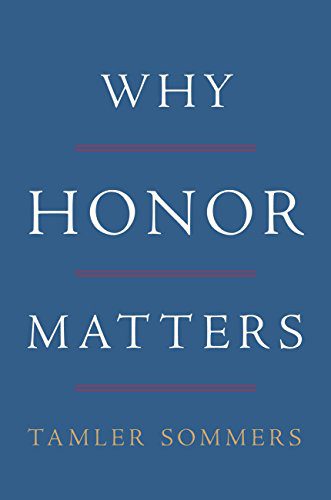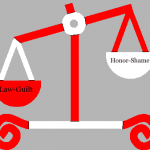 Why Honor Matters will be one of the most significant and controversial books of the year.
Why Honor Matters will be one of the most significant and controversial books of the year.
I waited almost a year to receive my copy of Tamler Sommers’ Why Honor Matters. I was not disappointed. It is now one of my favorite books on honor and shame. And, as you might know, I’ve read a lot of them, having written my dissertation and other publications on the subject.
A Practical Perspective
The author is a philosophy professor at the University of Houston. Don’t get the wrong idea, though, as this is not a book of dry academic philosophy. Sommers writes with a broader audience in mind. I found myself laughing out loud many times.
Before finishing the Prologue, I already knew I was reading something special. The book could easily have been titled The Ethics of Honor, since it deals with several practical implications of honor, particularly in a Western context. In critiquing common ethical perspectives in the West, he writes,
They try to show what an ideal society of rational agents would look like. The elegance and simplicity of their theories mislead us into thinking that their principles, properly applied, will result in a perfectly just society…. The more abstract and simple the theory, the less it can tell us about our actual lives and struggles.
…Honor, unlike dignity, is not abstract; it’s grounded in fact. Honor is real only when people recognize and acknowledge it. Honor codes are local, not universal, tailored to the particular needs of each community. Most important, honor codes are tailored to people as they are, not how we wish them to be or how we imagine they would be if they were “rational.” Honor is full of compromises; it deals in grays rather than black and white. It seeks better alternatives, not ideal alternatives. In short, honor is a thoroughly nonideal form of value, which allows it to operate with a more accurate understanding of human psychology.
Throughout the book I’ll try to convince you that these two aspects of honor—its attractive virtues and the unsystematic nature of its codes—are intimately connected. Honor frameworks recognize that it’s not easy to be virtuous: to take risks and act with integrity and solidarity. (p. 8)
Such a realistic perspective permeates the book. Sommers does not pit one view against another as though honor represented one of two mutually exclusive alternatives.
Defining “Honor”
Sommers aptly notes why many people struggle with the concept of honor. He says,
Part of the problem, especially for philosophers, is that honor is so hard to pin down. Philosophers like their concepts crisp and definable. The dominant approach in philosophy is called conceptual analysis: an attempt to come up with necessary and sufficient conditions that capture every instance that the concept is used. Honor emphatically resists this kind of approach….
But “undefinable” isn’t the same as “unreal.” (p. 4–5)
One reason people struggle to define “honor” is that a wide range of scholars from different disciplines has written on the topic. This is why I wrote “Have Theologians No Sense of Shame” (published in the upcoming August 2018 issue of Themelios). In the article, I explore ways the Bible helps us synthesize various aspects of honor and shame.
The Virtues of Honor
Rather than define honor, he explains how it manifests in practice. Sommers highlights the virtues of an honor perspective. Never losing sight of the limitations of honor, he argues for an integration of perspectives, combining the best of what he labels “honor” and “dignity.”
When it comes to honor, we’re positively schizophrenic. On the one hand, we have deep nostalgia for the honorable way of life. Whole genres of literature and film feed off this nostalgia. Not just mob movies, but westerns, film noir, revenge stories, Jane Austen novels, even musicals (think Hamilton). The virtues associated with honor such as courage, loyalty, solidarity, accountability, and integrity are precisely what we find lacking in the modern world. (p. 2)
He adds,
Courage, integrity, solidarity, drama, hospitality, a sense of purpose and meaning—these are attractive values and characteristics, important for living a good and worthwhile life. (p. 7)
What about traditional Western views of morality? Sommers says,
At its best, it produces a society with more equal treatment, one that respects its citizens and allows them to pursue their interests and goals without interference.
But liberal Enlightenment morality is not perfect, and it’s not sufficient. It can also lead to increasing alienation, selfish individualism, and a high-minded disregard for the struggles and suffering of others. (p. 9)
Why Honor Matters Matters
This post is a mere introduction to Why Honor Matters. Future posts will highlight selective portions of the book. There’s no need to wait until later posts to check out his book…. trust me, you will want to read this for yourself.
To conclude, I include the Table of Contents below for your benefit.
PROLOGUE: Honor Matters
CHAPTER ONE: Contours of Honor
CHAPTER TWO: Living Without Honor
CHAPTER THREE: Honor and Community
CHAPTER FOUR: Violence and Aggression
CHAPTER FIVE: Honor and Revenge
CHAPTER SIX: Honorable Justice
CHAPTER SEVEN: Honor Contained













